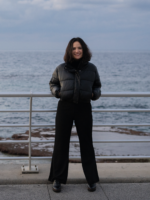Poem of the Week | November 20, 2023

“The Death” by Maureen Alsop
This week’s Poem of the Week is “The Death” by Maureen Alsop.
Maureen Alsop, Ph.D. is the author of Arbor Vitae (forthcoming); Tender to Empress (visual poetry); Pyre; Mantic; Apparition Wren (also a Spanish Edition, Reyezuelo Aparición, translated by Mario Domínguez Parra); and Later, Knives & Trees; Mirror Inside Coffin; and several chapbooks including Come Ghost (forthcoming); Sweetwater Ardour; Nightingale Habit; and the dream and the dream you spoke. She is the winner of several poetry prizes and was recently shortlisted for Montreal International Poetry Prize. Her poems have appeared in numerous journals including Columbia Review, Hyades Magazine, The Laurel Review, AGNI, Blackbird, Tampa Review, DIAGRAM, Action Yes, Drunken Boat, Memorious, The Kenyon Review, and featured on Verse Daily. She has a debut short story forthcoming with South Dakota Review. She teaches online with the Poetry Barn. She is a Book Review Editor and Associate Poetry Editor at Poemeleon.
The Death
Autumn, translated as the scent of factory smoke, clung—
mid-air in a room, in a twilight, where the sky lay
balanced within my fist and the boundary of death’s voice—faded
into a mineral delta, a boundary where a horse along a river
would wake in a blur. Let’s say it was a vision, not a departed
memory, but a passage. I don’t know where the longing
came from. But
I followed it. I followed it farther
than that old road, farther
than the well-lit tavern, where inside, on a cold night, the legs
of the lovers entwined beneath a rickety table
and each lover became a dream to the other. Yes, I followed
the road but the road ended.
You’re supposed to be an enemy – he said.
And when he said that to me, I challenged myself. I sat
without sympathy to those caught disembodied, and
to prevent my own helplessness, I shared the bread
of their ghost, the tremor, the distortion. Some call this
god. I always thought it was recollection. This millennium
is full of doubt. I waited
along the pitted ribs of the beach, the beach
as a furnace, tilts the sea. And the sea drains right there beneath
another sea. All hatred washes out. In that twilight room
I painted lines between each speck on the wall. I was not
instructed to do that. I did not desire
to get up. I wanted
an easy sentence: pronoun verb noun
adjective. I agree with some reinventions. Yes, skylark-
August, an ongoingness. I read the hemlock leaves:
clarity, tyranny, rage. What held me,
I pretended, was western, distant, now
beheaded: waxflower,
monkshood, ailanthus.
He turns the page and considers the word fragile
then stops. He was not pitying. But I take specific
action to his suffering. I take action to sing under
the unity of light, a blue pearl, a stream. And to sing again as in time
with the rose, hallucinating and open—a scorched star, a blameless,
shapeless figure without desire. I hold
the hand of winter deep beneath the trees. His eyes
in floodlit dream—a forest along the horizon
defines the sickness of ghosts—
as change in the wind
predicts a sickness. I speak
to the body between us. I speak
to the ghost who thaws
the spring snow.
Author’s Note
Even death is permeable, as Whitman wrote: “ They are alive and well somewhere,/The smallest sprout shows there is really no death…” In “The Death,” death as a lover, confronts the premise of fear. The speaker holds no conflict against death, and readily communes with ‘the beyond.’ In a cupboard I frequent, I’ve posted the image of Dali’s ‘Meditative Rose.’ Death is not the closing, but the opening of the rose, which in transgression like the sun, illuminates the unconscious.
SEE THE ISSUE
SUGGESTED CONTENT

Poem of the Week
Apr 29 2024
“This Body is a Songbird in a Kiln” by Athena Nassar
“This Body is a Songbird in a Kiln” by Athena Nassar is our Poem of the Week. Athena Nassar is an Egyptian-American poet, essayist, and short story writer from Atlanta,… read more

Poem of the Week
Apr 22 2024
“Faith” by Nur Turkmani
“Faith” by Nur Turkmani is our Poem of the Week. Nur Turkmani lives in Beirut and researches social movements, gender, displacement, and agriculture. Her writing appears in West Branch, The… read more

Poem of the Week
Apr 15 2024
“Love Poem for Lois” by Regan Green
“Love Poem for Lois” by Regan Green is our Poem of the Week. Regan Green grew up in Columbia, Tennessee, and now lives in Baltimore. She is a junior lecturer… read more

